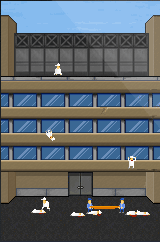In the video game world, little can do more to send your sales soaring than being banned in one way or another. Be it because a country’s government got upset over how their people were depicted (a la Modern Warfare in Saudi Arabia) or because the developers slipped in a naughty little easter egg thereby triggering a recall (like Grand Theft Auto San Andreas’ infamous Hot Coffee scene), that little bit of taboo can be all it takes to rule the charts for weeks.
That is, unless you’re selling your game exclusively on the iOS App Store, in which case you’re totally boned… unless your goal was to spread a message, in which case it’s back to being the best thing you could have hoped for.
Such is the case for Phone Story, a blatantly anti-iPhone game that managed to wiggle its way into the App Store for a whole seven hours before someone pulled the plug. Why, you ask? Amongst other things, making a mini-game out of the Foxconn factory suicides.
The game was made by Italy’s Molleindustria. Their tag line pretty much sums up their mindset: “Radical games against the dictatorship of entertainment.”
Molleindustria seems to have four main qualms with Apple and the iPhone, with each given its own mini-game:
- Coltan mining (wherein you’re seemingly supposed to keep miners mining with armed guards)
- Suicides (wherein you try to catch Foxconn workers as they jump from the top of the factory)
- Obsolescence (wherein you try to hoard customers into Apple stores as quickly as possible after a new release)
- eWaste (wherein you pass electronic components to workers for breakdown in an obviously hazardous work environment)
To be clear, the game was pulled before I got a chance to nab it (though a few people seemingly managed to grab it, dampening my worries that this was just a clever hoax), so my descriptions of the mini-games are from screenshots and what I’ve managed to piece together. If anyone has video of the game, please let us know.
Apple managed to find four App Store terms to cite in the banishment of the game, at least two of which are arguably a stretch:
15.2 Apps that depict violence or abuse of children will be rejected
16.1 Apps that present excessively objectionable or crude content will be rejected
21.1 Apps that include the ability to make donations to recognized charitable organizations must be free
21.2 The collection of donations must be done via a web site in Safari or an SMS
The last two are those that seem a bit questionable — while Molleindustria did promise to donate their cut of the App Store revenue to “organizations that are fighting corporate abuses”, the company says there was no mechanism for making donations built into the actual app. But really, Apple probably could have said “Er, yeah, you made a mini-game out of people killing themselves” and few would have earnestly questioned its banishment.
Of course, Molleindustria’s mission was almost certainly not to make a pile of money, be it for themselves or any charitable organization. Their mission was to spread their message. Mission accomplished.




